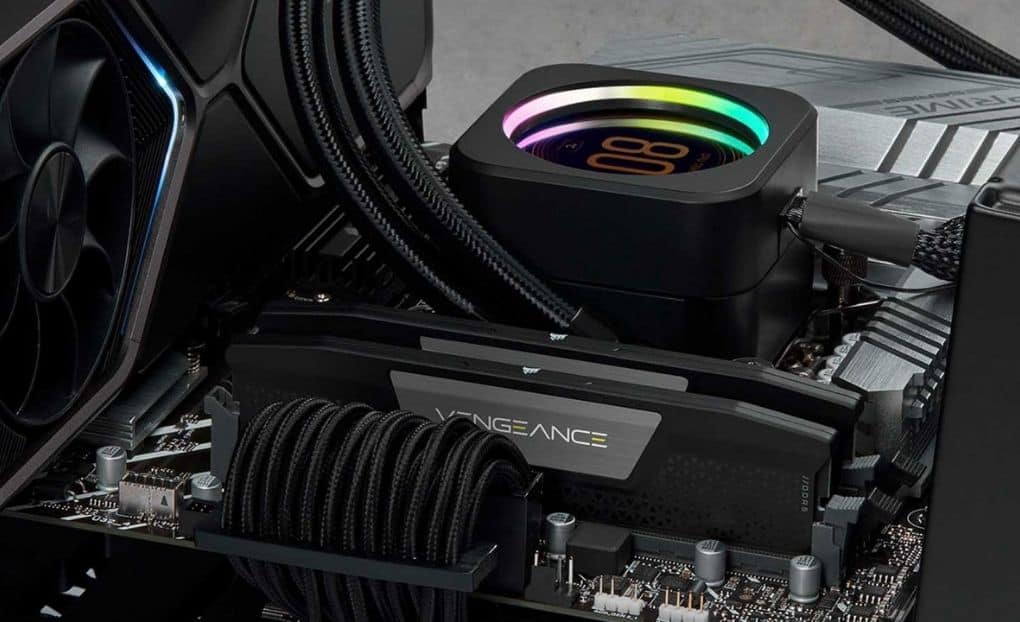
Home » Hardware » Components » RAM » Corsair DDR5 Vengeance RAM Review
Corsair DDR5 Vengeance RAM Review
Corsair DDR5
Corsair is among the first manufacturers to meet the new Alder Lake platform with its DDR5 RAM. DDR5 is more expensive than the more widespread and mature DDR4 standard. In its offer of DDR5 modules, the famous Corsair offers cheaper Vengeance and a slightly more costly Dominator Platinum with RGB effect.
The tested Corsair DDR5 Vengeance kit comes in a 32 GB (2x16GB) configuration and speeds of 5200 MHz. The biggest drawback of the new modules is the price. Although they are much more expensive than standard DDR4 modules, the demand for new DDR5 modules is relatively high.

| Corsair Vengeance DDR5-5200 | |
| Type | DDR5 DIMM |
| Capacity | 2 x 16 GB |
| Chip configuration | Micron-A, 1 rank |
| XMP Profile | DDR5 5200 38-38-38-84-126 @ 1.25 V |
| Voltage | 1.1 V to 1.25 V |
| Dimensions | 35 x 133.35 x 7 mm |
| Cooling | Passive aluminum heatsink |
| RGB | No |
| ECC | Non ECC |
Pros
- Good heatsink and temperatures
- Height compatible with most air coolers
- Management of XMP profiles form iCUE
- Slight overclocking
- Long warranty
Cons
- High price compared to DDR4
- Symbolic performance compared to DDR4

DDR5 vs. DDR4
DDR4 modules have already reached the limits of frequency and latency, so the natural sequence of things is the transition to the new generation of DDR5. The gaming industry is pushing for progress and always looking for better and faster ways to give gamers the best gaming experience.
The new Intel Alder Lake platform is currently the only one to support new DDR5 modules with 4800 MHz or higher speeds. In addition, the new DDR5 consumes almost 20% less energy than DDR4. For example, DDR5 at 4800 MHz has an operating voltage of 1.1V, while a DDR4 module (of the same frequency) would need an operating voltage of 1.5V or more.
A novelty is introducing the new XMP 3.0 standard for JEDEC overclocking profiles. The manufacturer defines three profiles with two more that you can configure to adjust the frequency, voltage, and latency.
An integral part of the XMP 3.0 standard is the Dynamic Memory Boost function for overclocking RAM in real-time according to system requirements and without your intervention.
It’s important to note that the new DDR5 memory comes with a 50% improvement in bandwidth. Each module has two independent 32-bit communication subchannels while retaining 64-bit data width. There’s an improvement in communication transfer, efficiency, and latency.
Everything written looks nice on paper and in theory until we see the actual results and the real improvement of DDR5 over DDR4.
Corsair Vengeance DDR5-5200 32 GB (2 x 16 GB)

Corsair Vengeance DDR5 is available in speeds from 4800 to 5600 MHz and memory kits of two modules of 16GB (32 GB) or two modules of 32GB (64 GB). As you can see, the capacity of DDR5 memory kits is noticeably higher than the older DDR4 standard.
In addition to capacity, the Corsair gives you a choice between dark gray and white aluminum coolers on the modules. The heatsinks are 35mm high, suitable for better compatibility with air CPU heatsinks.

If you opt for an AIO cooling solution, you can choose the more attractive Corsair Dominator Platinum RGB DDR5.

A novelty with DDR5 modules is that they also have PMIC (Power Management Integrated Circuit), i.e., a controller (Renesas P8911), which receives a voltage between 4.25 and 5.5 V from the board.
The controller reduces mentioned voltage to (usually) 1.25V and delivers it to the memory modules. In an older standard (DDR4), a memory voltage was taken care of by the motherboard itself and not by a module’s special chip.
The memory kit on the test has an XMP profile with speeds of 5200 MHz and latencies of 38-38-38-84-126. The voltage is 1.25 V. If you look at the picture, the fastest JEDEC profile loads a clock of 4800 MHz with latencies of 40-40-40-77-177 with a lower voltage of 1.1 V.

Corsair iCUE

To take full advantage of the Corsair DDR5 module and XMP 3.0 technology, you must install iCUE software. With the new version 4.22, you will be able to manage XMP profiles from iCUE, create your own and load them directly into the BIOS (the motherboard needs to have a compatible BIOS.)
So, in addition to monitoring the module’s temperature, voltage, and frequency in real-time DDR5 modules, it’s also possible to manage XMP profiles.
Corsair DDR5 test
I tested Corsair DDR5 on the Asus ROG Strix Z690 and ROG Strix B660I Gaming WiFi motherboards. If your 5200 MHz is low, Corsair has faster modules like 6200 MHz with CAS 36 (Dominator Platinum), but you have to pay more than the tested Vengeance.
Every gamer is interested in how much DDR5 contributes to increasing the performance of the new Alder Lake platform. For this purpose, I compared a motherboard with DDR4 slots, ASUS Prime Z690-P. Both boards use the same CPU, currently the strongest Intel Core i9 12900K and EVGA RTX 3080 Ti graphics card.
The Asus Prime Z690-P board used a Corsair Vengeance LPX DDR4 3600 CAS 16. Considering the specifications, price, and new technology, I expected a lot from the latest DDR5 standard. Unfortunately, the differences in performance between DDR5 and DDR4 are pretty symbolic.
In the coming period, better DDR5 memory in terms of higher clock speed and lower latencies will likely give better results. If you have already bought a motherboard with DDR5 slots, you are forced to buy new memory.
Overclocking the Corsair Vengenace DDR5 doesn’t give some high values. You can get a stable clock of 5400 MHz, but with a latency of CAS 40 and an increase in voltage to 1.35 V.
Conclusion
The Corsair Vengeance DDR5-5200 only makes sense to buy if you bought a motherboard with DDR5 slots or want to move to a new standard. You will get quality and reliable RAM with a lifetime warranty without RGB lighting. However, if you are already opting for DDR5, I recommend buying the RGB model (Dominator Platinum) for a more attractive look and an acceptable price difference.
The advantage of the Corsair Vengenace is its compact dimensions so that you can install the air cooler more easily. As for the gains in performance compared to DDR4, we will have to wait a little longer for the differences to become noticeably measurable, and the prices will reach an acceptable level. Until then, stick to quality DDR4 modules.









